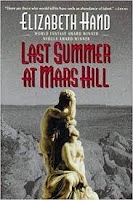I have read a huge swathe of Elizabeth Hand's ouevre. She keeps producing tasty meals, and I keep devouring them. But for whatever reason, her first collection, Last Summer at Mars Hill (1997), eluded me for years. That has been remedied. And it makes me wonder whether she was born a chef.
The collection kicks off with the title story—a novella actually, “Last Summer at Mars Hill”. A poignant, soft-spoken story, it tells of a pair of teens, Moony and Jason, and their last summer vacation before university. Terminal illness, mysticism, painters, hippies, and the Maine coast all featured, the story ultimately pulls gently but firmly on the heartstrings without resorting to cheap drama. (Longer review here.) A tale of faery (maybe even phaery), “The Erl-King” is a jungle of a story with exotic animals, the ethereal, and an occasional Texas accent. And it only gets wilder. Ambitious, I daresay it's not as mature as later Hand novellas but at least keep the dynamic meter spinning. A hard-edged, angry thriller, “Justice” tells of a journalist investigating mutilated hogs in a farmer's field in Oklahoma. Uncovering more than she ever expected, she finds a whodunnit, but it's certainly not the serial killer she expected. It’s strange that I wish this story did not have fantastical elements...
A brief interlude, “Dionysus Dendrites” is a poem about something distantly frightening yet dreamlike, creeping yet... just read it. “The Have Nots” is about a small town beauty down on her luck, that is, until she is gifted a sky-blue Cadillac. Trouble is, she needs to wait a couple decades for the stars to realign. Hand captures a nice authorial voice, and eschews standard dialogue in this hillbilly heaven and hell. Somehow gothic science fiction, “In the Month of Athyr” is a story from the life of a boy named Paul who attends a Catholic boarding school orbiting the Earth. Possessing a shadowy gloom one expects seeing the word 'gothic', Paul learns about the birds and bees in a way only the future can teach. His resulting loss of innocence is eerie, and certainly more symbolic than graphic. “Engels Unaware” is an edgy spot of satire. Hand relates the story of a temp secretary starting a new assignment at a major financial firm in a skyscraper forest. Matters escalate nicely into an inferno of metaphorical proportions.
“The Bachae” is a story evoking the danger of myth yet in a near future/realist setting. It tells of a man Gordon, and one shocking night out he has with his girlfriend. Imagery wholly complementing mood, this is a visceral experience (and the “orgy” in the story is very well played). From something classical to something classic, “Snow on Sugar Mountain” is one of the most pat, easy-to-root-for stories in the collection. It tells of a boy with Native American blood whose mother dies, leaving him alone in the world. But not toothless. A shapeshifter, the boy has an ancient stone which allows him to take the form of animals. Accidentally running into an old man one day, the odd pair’s relationship helps dictate their directions in life. It’s a sentimental story that never wholly crosses into maudlin land, but does threaten too often.
A combination of fantasy and sf, “The Boy in the Tree” sees people linking minds in a technology augmented therapy process called empatherapy. Admittedly an ambitious story, once the reader sets aside the hand wavy, speculative science, things flow nicely. And finally, closing the collection, is a short spot of well done, Twilight Zone-ish horror in “Prince of Flowers”. A kleptomaniac at the Smithsonian steals one artifact too many, and at home discovers she may have chosen the wrong thing to steal. The story won't win any prizes for originality, but does the formula well enough to keep the reader glued to the page throughout.
In the end, Last Summer at Mars Hill is a debut collection that is better than it has a right to be. Hand's style is largely mature, and the stories offer a wide variety, a variety that many veteran writers cannot match. But perhaps most importantly, it has now been almost twenty-five years since the collection was published, and most of the stories do not feel of their era. Almost all can be read and appreciated today just as yesterday. While I believe Hand's ouevre can be entered at almost any point, this may be one of the better.
The following are the twelve stories contained in Last Summer at Mars Hill:
Last Summer at Mars Hill
The Erl-King
Justice
Dionysus Dendrites
The Have-Nots
In the Month of Athyr
Engels Unaware
The Bacchae
Snow on Sugar Mountain
On the Town Route
The Boy in the Tree
Prince of Flowers


No comments:
Post a Comment